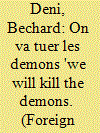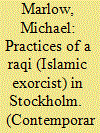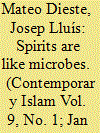|
|
|
Sort Order |
|
|
|
Items / Page
|
|
|
|
|
|
|
| Srl | Item |
| 1 |
ID:
129233


|
|
|
|
|
| Publication |
2014.
|
| Summary/Abstract |
Inside a small concrete church, lit by a few tungsten bulbs hanging from exposed wires, hundreds of people stood packed Together in stifling heat, repeating the words their pastor Bellowed into a microphone. It was after midnight in Kinshasa, the capital of the Democratic Republic of the Congo, but the service was just getting under way. The pastor, Pierre Pinda Buana, wore a simple, blue button-down shirt. Its acrylic shimmered as he moved around the center of the room--smooth, practiced, confident. For almost an hour, Pinda led his congregation through songs and chants, the fervor in the church mounting. Then he preached about the main event they had all come to witness: exorcism. Charles, a Congolese friend of mine, who asked that I not use his real name, translated Pinda's words from Lingala, a local language, to French. But the cries, clapping, and ululations of the crowd often drowned out his voice. Pinda began describing a demon that was living in the body of a woman who stood before him, almost entirely blocked from my sight by the crowd: "It's attacking the heart. It's attacking the stomach. It strikes faster than an arrow." He called out to the demon, asking why it wanted to kill the woman. Electrical contacts crackled--I glimpsed a church assistant crouched over a fuse box in the rear doorway--and the bulb dangling above Pinda went dark. Light fell inward from the corners of the room, yellow and angular. Suddenly, the woman collapsed onto the ground and began shouting. The crowd pressed in around her as she writhed and arched her back.
|
|
|
|
|
|
|
|
|
|
|
|
|
|
|
|
| 2 |
ID:
188969


|
|
|
|
|
| Summary/Abstract |
This article investigates in depth the practices of a Stockholm-based raqi. In the first section, the principles and methods of his version of ruqya (Islamic exorcism) are described: which Qur’anic passages he perceives as being most suitable to read in the cases of different afflictions, how he complement his reading with the use of his right palm to detect the possession, and his use of the “satanic meridians,” i.e., pressure points to use to facilitate the eviction of stubborn djinns. Later, the cases of five patients are discussed in order to shed light upon those who seek out his services. One particularly interesting example concerns a patient who regularly takes ruqya against sorcery. Despite the fact that she does not believe in sorcery herself, she considers ruqya more beneficial for her well-being than Western treatments. Next, the raqi’s perspective on psychotherapy and on mental illness in general are then presented. Finally, the problems of non-contextualized interviews versus ethnographic observations carried out as part of fieldwork for the purposes of gathering information are illustrated.
|
|
|
|
|
|
|
|
|
|
|
|
|
|
|
|
| 3 |
ID:
137512


|
|
|
|
|
| Summary/Abstract |
This article analyses the revitalisation of Islamic exorcism in Morocco since the 1990s and how its practitioners legitimise it as a ritual largely adapted to theological orthodoxy. The rhetoric of these exorcists on spirit possession defines certain afflictions as an intromission of the genies (jnun) into the body by physical mechanisms, comparable to the processes undertaken by microbes. From interviews and observation of ritual exorcism of Moroccan faqihs in Tetuan and Barcelona, I analyse their techniques and the way they legitimise them. I conclude that the moral intervention of religious specialists through Koranic recitation becomes effective throughout a dynamic worldview that reinforces old basic assumptions about a physical intercourse between jnun and humans. At the same time, with the revitalisation of the ritual, many Koranic exorcists incorporate new rhetorics to demonstrate scientifically the materiality of the jnun and their effects on the possessed bodies. But Moroccan Koranic healers not only rework definitions of affliction and legitimise the physical agency of the jnun, they also contribute to define gendered experiences of the body as far as women are conceived as the favorite and weakest victims of the genies.
|
|
|
|
|
|
|
|
|
|
|
|
|
|
|
|
|
|
|
|
|